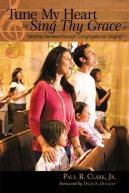 The season of Lent comes to its climax this coming week as Christians around the world observe Holy Week, commemorating the events that were the culmination of Jesus’ earthly life, the effects of which are foundational to our Christian faith.
The season of Lent comes to its climax this coming week as Christians around the world observe Holy Week, commemorating the events that were the culmination of Jesus’ earthly life, the effects of which are foundational to our Christian faith.
Palm Sunday can be so much more than an opportunity to involve children and foliage in the worship service. Robert Webber had a wonderful way of bringing attention to the spirituality of specified times in the church year, and I believe the season of Lent leading to Holy Week leading to the Great Triduum were richest of all in his explanations and exuberance. And rightly so. In usual Webber fashion he was able to articulate in a succinct manner the epic themes in the Christian year in his book, Ancient-Future Time: Forming Spirituality through the Christian Year. Perhaps you, like I will be made spiritually better prepared to lead and/or participate in Palm Sunday by considering these spiritual connections and reflections on biblical description of what is happening in the Triumphal Entry into Jerusalem. My prayer in sharing these reflections is that you might find something that will help you lead others to worship in awareness of the meaning of this special day that begins a hallowed week. 
- Just as Jesus entered into the gates of the city of Jersusalem to face the culmination of his earthly life and ministry, you and I enter into the remembrance of these things and face those distractions that get in the way of our spiritual well-being and fervency in our walk with Christ.
- As Jesus faced the dramatic change in how people viewed him, from cries of “Blessed is He!” to “Crucify Him!” we enter that gate with him, and our spiritual lives are being “ordered into the most sacred moments of the history of the world and we face our own experience with the meaning of human existence.” (Webber) What will take priority, man’s praise or God’s way of humility?
- Even though we may have answered this question already as believers, we can re-examine our answer as we hear the crowd ask aloud, “Who is this?” In public worship we are certainly looking to answer this question and proclaim that answer as witness to those who may not know the truth of the Gospel.
- In whatever way we will observe Holy Week we can call one another to live lives that look past the momentary festivities to the way of the cross, knowing that it is the way of life and peace, and giving thanks for the hope of the glorious resurrection to come and the ascension that places our High Priest at the right hand of the Father making intercession for us.
As we sing the Loud Hosannas of Palm Sunday and many of us turn quickly to the somber tones of the cross, may we serve as true worship leaders by inviting our brothers and sisters to the spirituality of Holy Week, not as a cultural observance of a time of year preparing to dawn our new Easter Sunday duds, but as a time of spiritual journey in which we are refreshed through the Gospel miracle of dying to self and being raised to walk in the new life of the resurrected Christ.
Almighty God, whose most dear Son went not up to joy but first he suffered pain, and entered not into glory before he was crucified: mercifully grant that we, walking in the way of the cross, may find it none other than the way of life and peace; through Jesus Christ our Lord. Amen.[1]
[1] The Book of Common Prayer, 272.



